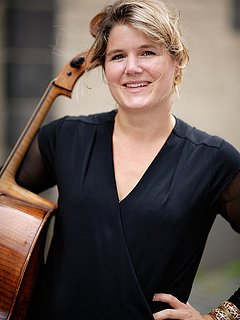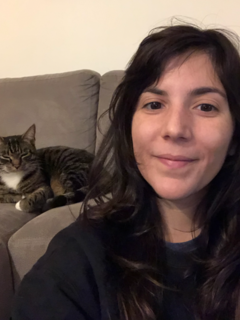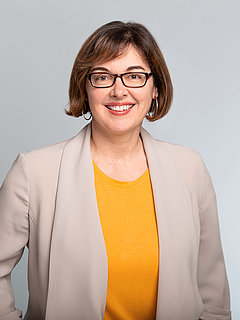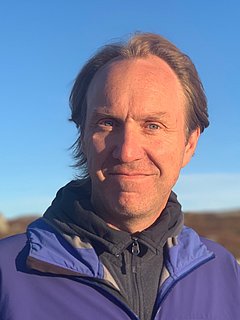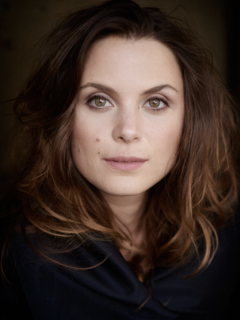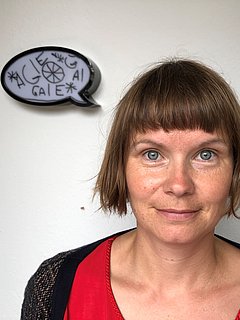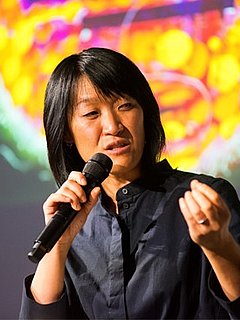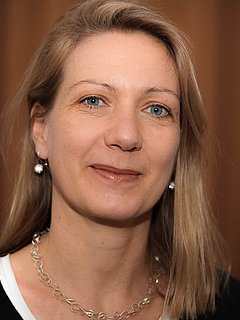LAB3 Team
Jan Burkhardt loves to shine a light on the continuous interconnectedness of body, space and time, and uses the body’s sensations as one of the fundaments for creative processes in general, and more specifically in the context of contemporary dance, often interwoven with interdisciplinary features. At HfMT, he teaches contemporary dance practice in diverse somatic and artistic settings, while he continues to be involved in artistic productions in the free scene throughout Europe.
Evelyn Buyken is a research associate at the Institute for Historical Musicology at the HfMT Cologne and is also the content director and initiator of the inter-university Forum for Artistic Research. The musicologist conducts research at the interfaces between musicology and musical practice. One focus of her research is the musical culture of the 18th and 19th centuries. Her dissertation on the early reception of Bach in the Jewish salons of Berlin appeared in the "Beiheften zum Archiv für Musikwissenschaft" published by Franz Steiner-Verlag (July 2018) and was evaluated by an interdisciplinary team of reviewers in 2016. She is currently researching the body as a repository of musical knowledge. In doing so, she deals with historical material as well as empirical investigations that are oriented towards practice-based research methods from the field of artistic research. As a qualified cellist, she has specialised in the field of historically informed performance practice. She conducts the Cologne Baroque Orchestra, which she founded, and performs on national and international stages. CD recordings and radio recordings document her artistic work.
Together with her team she designs Lab 3 in Cologne.
Fernanda Ermelindo studies in the MA Dance Studies at the University for Music and Dance Cologne. Previously she studied dance at the Faculdade Angel Vianna in Rio de Janeiro. After her BA she continued her studies in New York City. As a contemporary dancer she has worked for the companies CMDC, Cyclo XXI Ballet Contemporâneo and Urbanus Triple Dance. She also was a member of the dance company De Funes Dance. As an assistant, Fernanda worked with the artist Anabella Lenzu and as a research assistant with the musicologist Marcia Taborda. She has teaching experience in ballet, contemporary dance and improvisation. Fernanda is also a certified English/Portuguese translator.
Sybille Fraquelli is an art historian. After studying at the universities of Bonn and Leicester (England), she worked as an editor at an international non-fiction publishing house. In 2006, she completed her doctorate at the Rheinische Friedrich-Wilhelms-Universität with a thesis on neo-Gothic architecture in Cologne, for which she received the Paul Clemen Scholarship in 2006. From 2008 to 2010, as a scholarship holder of the Fritz Thyssen Foundation, she researched the building history and furnishing measures of the 19th century in the Romanesque churches in Cologne. Since 2010, she has been working at the Cologne University of Music and Dance for the university cooperation "Kolleg der Künste" - a unique association of all art and music colleges in North Rhine-Westphalia for interdisciplinary project work in Montepulciano. Since January 2021, she has been supervising the implementation of the RAPP Lab as a research assistant.
Lars Frers is currently employed at the University of South-Eastern Norway, where he is the head of the university’s PhD program in culture studies (currently on a research leave). In his research, Lars is collaborating with people coming from many different disciplinary backgrounds, focusing on the multisensory, the peripheral, and grey zones. He teaches theory of science and research ethics and multimodal qualitative methods. His current projects explore failure in professional practice and ethics in using video based research methods.
Laurenz Gemmer’s artistic focus lies on piano improvisation, in which he has cultivated a unique, intuitive style of playing that is characterized by a crossing of stylistic borders while constantly striving for authentic musical quality. His studies with Paulo Álvares, Florian Weber and Hubert Nuß at the music colleges in Cologne and Osnabrück provided a thorough musical foundation in the areas of New Music, Jazz and “classical music”, thereby creating tensions among which Gemmer’s particular artistic expression evolves. He performs in and works for various band formations, dance and theatre productions, all of which are striving for unique musical expression through innovative sound timbres, custom-made compositions and improvisational spaces on the cross roads between musical genres. In a second musical identity, Gemmer is working on the fusion with a prepared semi-acoustic vintage grand piano (CP70) and software.
Gemmer teaches at the music colleges in Freiburg and Cologne.
Stella Louise Göke studied classical singing in the Netherlands and graduated with a Bachelor of Music in 2014. Since graduating, she has lived in her adopted city of Cologne and works as a freelance singer and actress in a wide range of projects across Europe. She has been studying music education in the Master of Arts programme at the University of Music and Dance in Cologne since 2019. Artistic research allows the young soprano to combine two passions of her artistic work: performing on stage as a singer, experiencing music, and scientifically penetrating these processes and discovering new, previously unimagined things.
The week in Oslo was so special for me because although everything went on Zoom (what can be very exhausting) we had a lot of time. There was space to breath, to let impressions sink and to give room to own thoughts. There were lectures from people and very interesting projects to talk about. But there were also experiments with funny things to do. Although I was in my room I started to sing and to explore my instrument in different ways. How do you reflect? Of course you can think about stuff but what else can you do? What material can you use? How can you tell somebody that you reflect without using your voice? And especially for me as a singer it was very interesting to start reflecting without my voice. Because I am used to use my voice all the time. They talked about and taught me to be open to use different materials. So I started to use a tomato. I reflected on the fact when I walk around I sometimes do not feel secure and I feel vulnerable. Especially on stage. And so I choose a tomato: It seems to be very strong, but it is soft and when you smash it, it exploses in every direction. And I kind of reflected on my thoughts of precarity by smashing tomatoes.
Constanze Schellow (Dr. phil.) teaches and researches as Junior Professor on cultures of knowledge and mediation in dance at the Center for Contemporary Dance at the Cologne University of Music and Dance. She is particularly interested in projects that question the body and movement in their social and reflexive possibilities in a wide variety of social contexts, and that stimulate dialogues from dance with practitioners in other fields. From 2018-2021, she led the international research project "Theoretical turn? On the institutionalization of theory/s in contemporary dance education" funded by the German Federal Ministry of Education and Research in collaboration with the dance programs at SNDO Amsterdam, Parts Brussels, Uniarts Stockholm, HZT Berlin, among others.
Nina Eidsheim is the author of Sensing Sound: Singing and Listening as Vibrational Practice and The Race of Sound: Listening, Timbre, and Vocality in African American Music; co-editing Oxford Handbook of Voice Studies; Co-editor of the Refiguring American Music book series for Duke University Press; recipient of the Mellon Foundation Fellowship, Cornell University Society of the Humanities Fellowship, the UC President’s Faculty Research Fellowship and the ACLS Charles A. Ryskamp Fellowship. She received her bachelor of music from the voice program at the Agder Conservatory (Norway); MFA in vocal performance from the California Institute of the Arts; and Ph.D. in Musicology from the University of California, San Diego. Eidsheim is Professor of Musicology, UCLA Herb Alpert School of Music and founder and director of the UCLA Practice-based Experimental Epistemology (PEER) Lab, an experimental research Lab dedicated to decolonializing data, methodology, and analysis, in and through multisensory creative practices.
Corinna Vogel has a diploma in music education and a PhD in philosophy (HfMT Cologne) and a degree in pedagogy (University cologne). She used to teach in a primary and a secondary school which she believes has given her practical experience in thinking outside of the box, and using various teaching styles to captivate a student’s individual imagination and creativity. Since 2010 she has been teaching at the Music department of HfMT and since 2019 also at the dance department. . Corinna contributes to intercultural community building with music and dance for different target groups and to offer seminars for music and dance students together. Her aims are to develop the individual artistic ideas of every student f.e. in integrating ideas of artistic resarch into the seminars. One of her main roles is developing community dance projects that connect contemporary music with dance improvisation.
